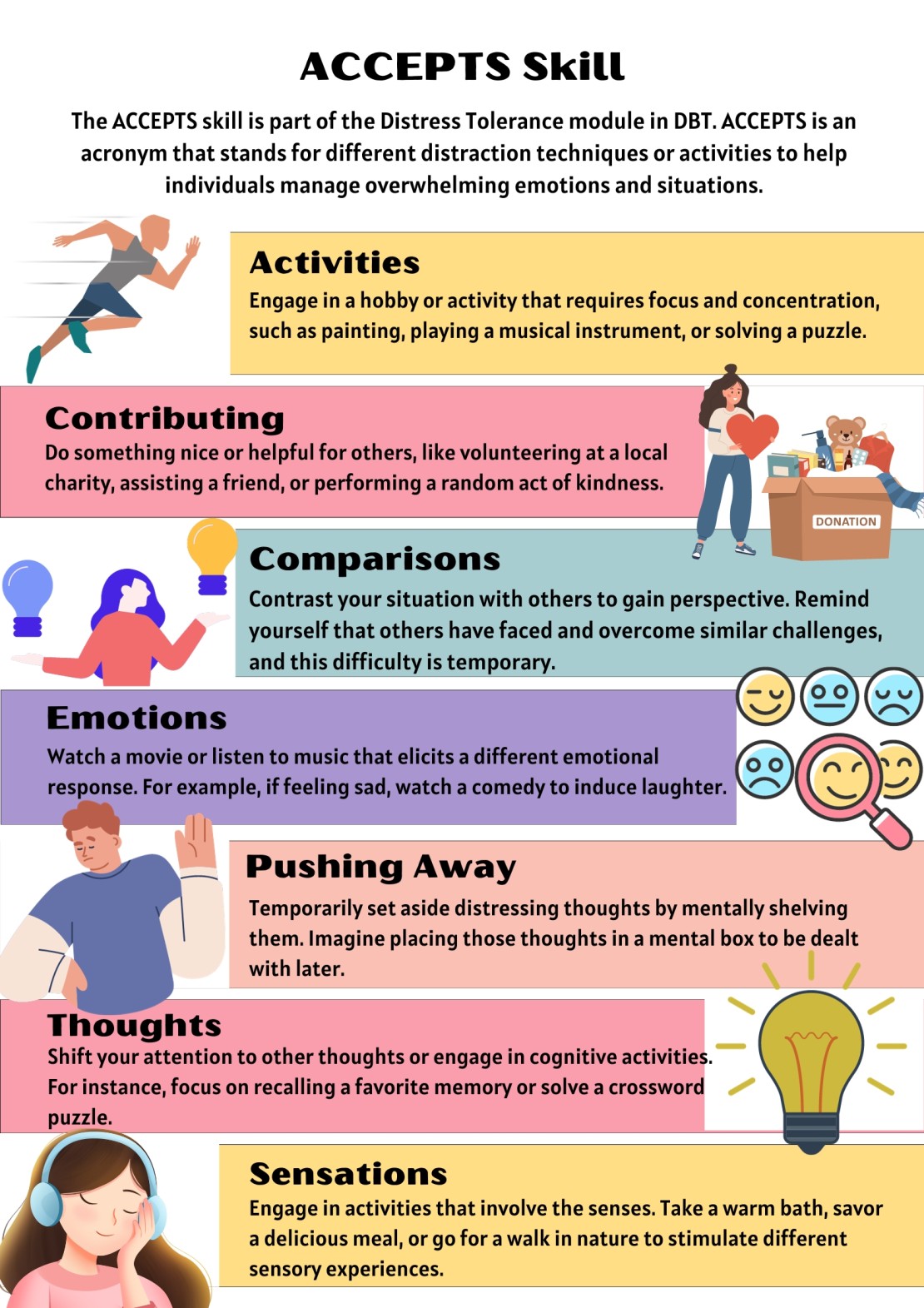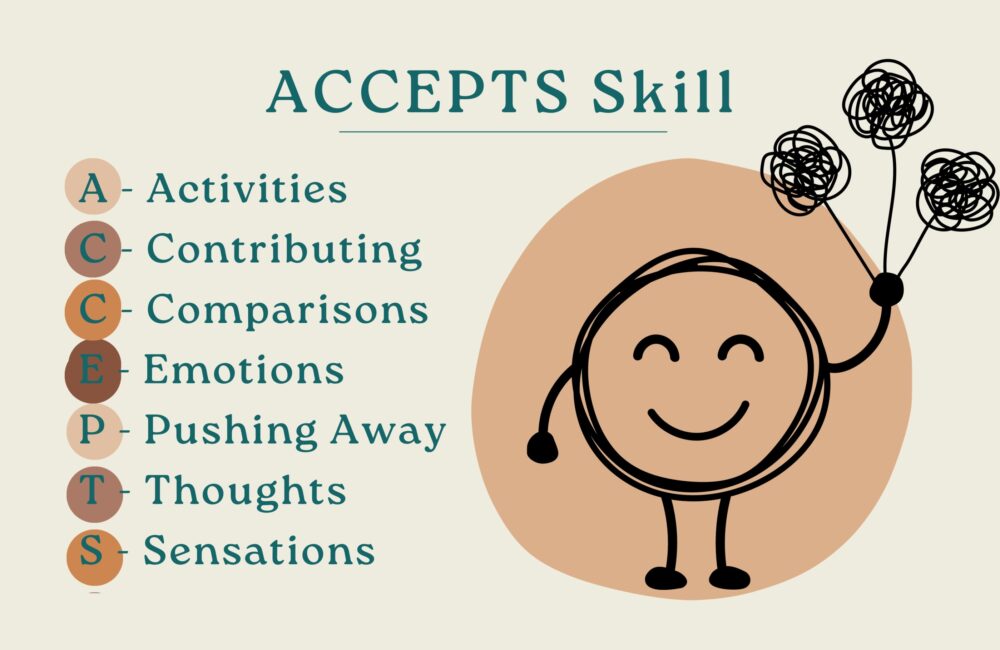As part of Dialectical Behavior Therapy (DBT), the ACCEPTS skill plays an important role in helping individuals overcome complex emotions and develop emotional resilience through distraction. It teaches people how to cope with negative emotions and avoid harmful decisions, offering several benefits when integrated into daily life.
What is the ACCEPTS Skill?
DBT, created by Dr Marsha M. Linehan, is a widely acclaimed therapy with worldwide recognition for its effectiveness in treating mental disorders. DBT, an offshoot of cognitive behavioral therapy, DBT consists of four core modules: Mindfulness, Emotional Regulation, Interpersonal Effectiveness, and Distress Tolerance. The ACCEPTS skill is a key component of Distress Tolerance associated with crisis management through activities intended to distract one from the ongoing emotional crisis. It is particularly helpful for those struggling with mental issues like borderline personality disorder (BPD), depression, anxiety, and substance abuse..
What do ACCEPTS stand for?
ACCEPTS is an acronym consisting of elements designed to help individuals manage distressing situations without making them worse. Instead of fighting against overwhelming emotions, ACCEPTS encourages individuals to engage and immerse themselves in activities that induce positivity in people. The acronym stands for:
- Activities: This includes engaging and grounding activities such as indulging in hobbies or simply taking a walk in nature. Immersing oneself in positive and enjoyable activities protects the mind against overwhelming feelings.
- Contributing: Includes distracting yourself by helping others through acts of kindness, volunteering, or supporting friends and family. This not only benefits others but also provides a sense of purpose and connection.
- Comparisons: Comparing your situation to that experienced by others helps you recognize how they, too, face challenges. This creates a sense of shared humanity and lessens the weight of personal distress.
- Emotions: This involves the acknowledgement of emotions without getting entangled in intense reactions. Emotions teach you to identify negative emotions and change your current state by focusing on something else, like listening to your favorite music or watching a comedy movie.
- Pushing Away: This encourages individuals to set aside distressing thoughts and emotions momentarily, providing a mental respite. Think of boxing up your emotions and placing them on an imaginary self, or picture your negative emotions floating away on a cloud.
- Thoughts: Associated with distraction from distressing thoughts by engaging in activities that require mental focus, such as reading, solving puzzles, or learning something new.
- Sensations: Engaging in enjoyable sensory experiences can help individuals mitigate the intensity of overwhelming emotions. such as taking a warm bath or listening to calming music.
ACCEPTS Skill Infographic

Benefits of the Accepts Skill
ACCEPTS has several benefits. The skill provides a toolkit for individuals to cope with distressing emotions without resorting to behaviour or making decisions that could prove counter-productive in any situation. By accepting the current moment and emotions without resistance, individuals can reduce their suffering and make more mindful choices.
Emotional Regulation
The ACCEPTS skill teaches individuals emotional regulatory skills that help distract them from a crisis or an emotionally challenging situation. Focusing on something else decreases negative emotions such as anger or anxiety. Moreover, accepting emotions allows individuals to regulate their emotional responses to respond rationally instead of impulsively.
Increased Coping Skills
Coping skills in DBT ACCEPTS can help individuals manage distressing situations effectively to reduce the intensity of a negative emotional state. Pushing away negativity, uncomfortable sensations, and thoughts paves the way to replace them with positive ones instead.
Enhanced Decision-Making
When individuals accept their emotions, they gain mental clarity, which facilitates better decision-making. Acceptance helps in stepping back from intense emotional states and making choices that align with long-term goals rather than momentary impulses.
Enhanced Self-Awareness
Self-awareness helps individuals identify the main triggers of anxiety, anger, and distress. Recognizing the warning signals of such sensations, one can prompt an individual to take steps to prevent them.
Improved Interpersonal Relationships
Acceptance of one’s own emotions contributes to increased empathy and understanding in interpersonal relationships. By learning to accept their emotions, individuals can extend the same acceptance to others, fostering healthier connections.
Stress Reduction
The Accepts skill provides practical techniques to manage and cope with stress. By incorporating these techniques into their daily lives, individuals can reduce their overall stress levels and enhance their overall well-being.
How to Apply the Accepts Skill
ACCEPTS in DBT can be applied in various ways that seek to influence a negative emotional status, replacing it with a positive, re-affirming one. Here are some ways to apply ACCEPTS.
Mindfulness
Besides being a mediative type of practice, mindfulness can also be applied in DBT to gain heightened awareness of one’s emotional state. Through mindfulness, you can learn to recognize current patterns of thought and even be intuitive of impending negativity or the onset of anxiety, depression, or anger. Techniques such as deep breathing, meditation, or body scans can help ground individuals in the here and now, fostering acceptance of their current emotional state.
Sensations
Shift your focus to physical sensations to distract from overwhelming emotions. This could involve holding an ice cube, taking a cold shower, or engaging in physical activities like exercise. The change in focus can provide a reprieve from emotional distress.
Contributing
Try to find volunteer work, such as helping a friend plan an occasion or community work. Donate things you don’t need to NGOS’s, if you’re an animal lover, volunteer at an animal shelter. Perform thoughtful actions that light up someone else’s day. Such actions don’t just benefit the receiver; giving brings with it immense self-satisfaction and joy.
Comparisons
Compare your current situation to a more challenging or distressing scenario you’ve overcome in the past. Reflecting on past resilience can instill a sense of capability and remind you that you have the strength to endure current difficulties. You could also compare yourself to those less fortunate than you or struggling with situations more intense than yours. This helps reduce the intensity of anxiety over one’s situation with an understanding of how it might be more manageable than someone else’s
Acceptance Statements
Practice acknowledging and accepting your emotions without judgment. Use statements like “I feel angry, and that’s okay” or “I am experiencing sadness, and that’s a natural part of life.” Acceptance and reaffirmation in a non-judgmental way can contribute to more emotional stability.
Imagery and Thoughts
Visualizing your happy place, such as a calm scene, a serene beach, or a peaceful forest, helps shift your focus and promote emotional acceptance. Better still, you could even recollect happy memories of past vacations. Try counting to 10; count colors in a painting or watch the clouds or sunset outside your window; Sing a song on repeat mode in your mind; watch TV or read a book; all these work wonders for your emotional status.
Conclusion
Integrating the DBT ACCEPTS skill in daily life might require initial practice, but once you perfect it, the skill can improve your overall quality of life. No one lives a happy life; everyone has their own level of ups and downs, emotional anxiety, stress, and negativity. ACCEPTS helps individuals navigate the negative aspects of life with acceptance and resilience. It helps improve relationships, but more than that, it is a tool for self-discovery, improving the relationship with oneself, and becoming a more content human being.















